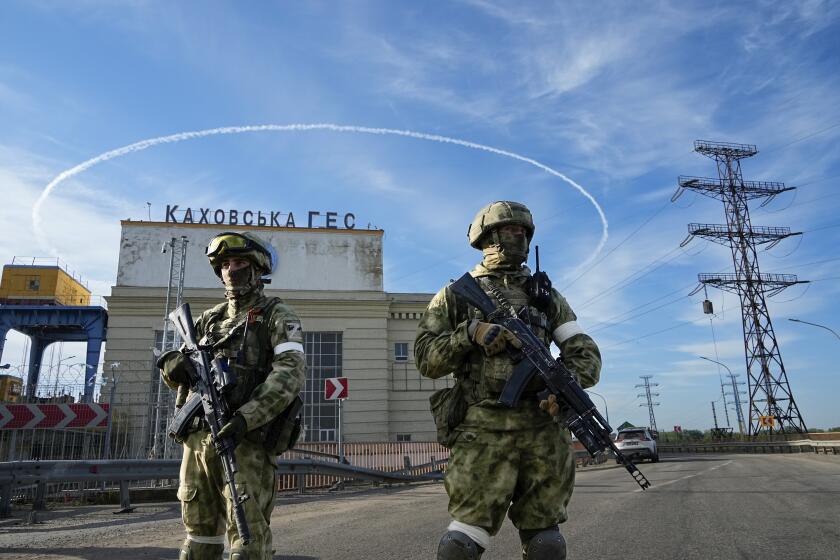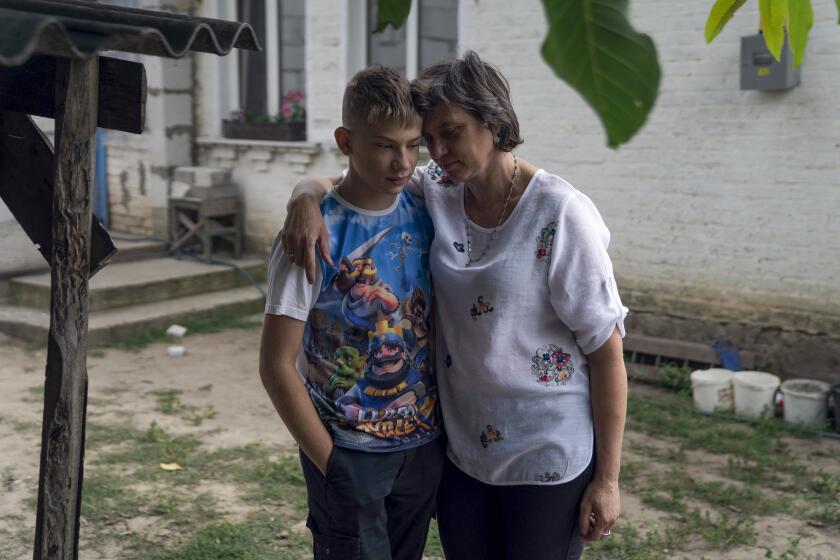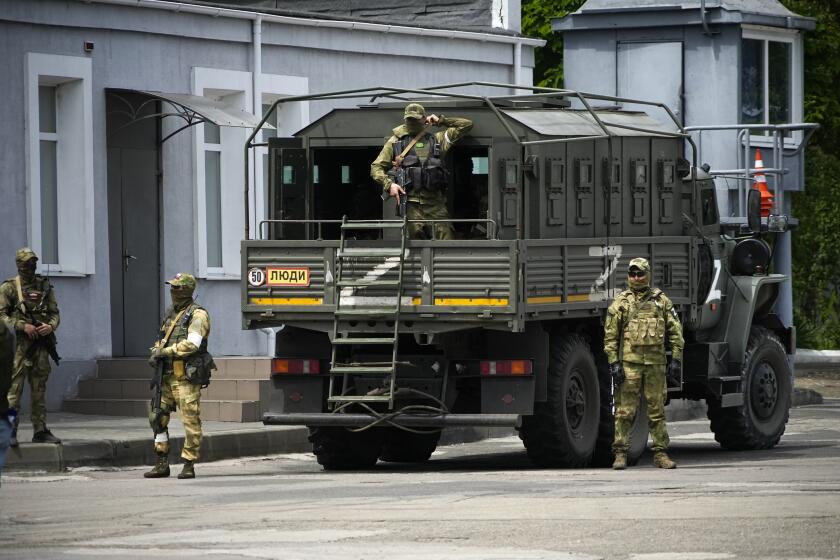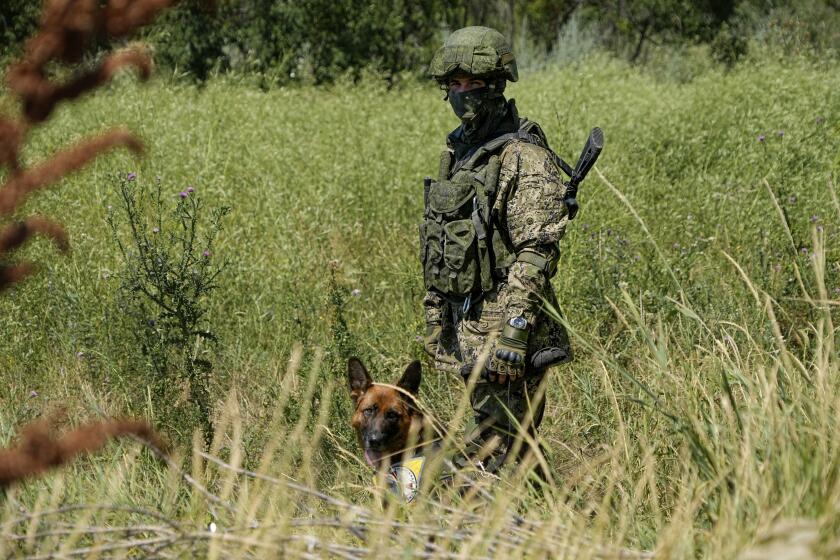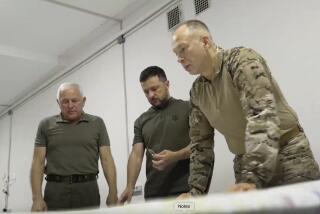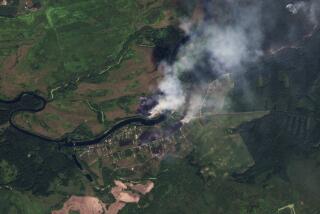Russian villages near Ukraine evacuated after another arms depot goes up in flames
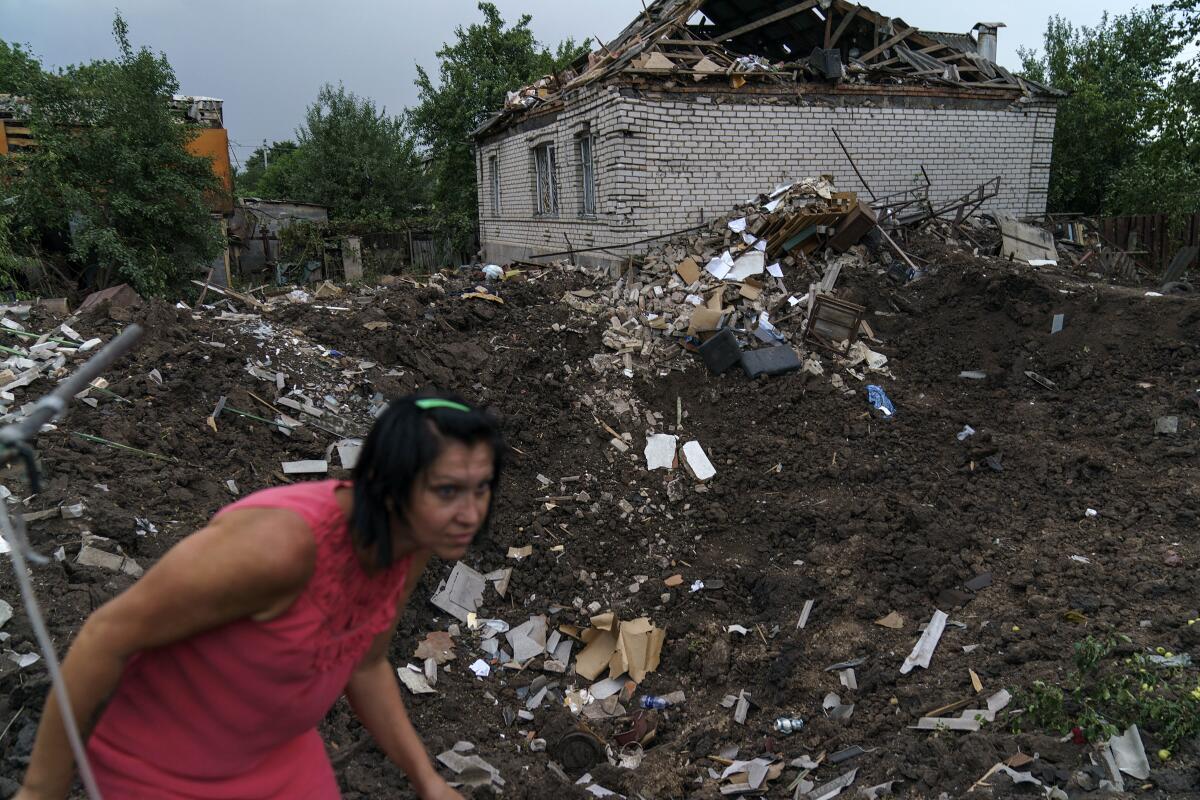
- Share via
KYIV, Ukraine — A fire at a munitions depot near the Russian village of Timonovo has led to the evacuation of two villages in Russia’s Belgorod region on Ukraine’s northeastern border, an official said Friday. The blaze was the latest in a series of destructive incidents on Russian-occupied territory in Ukraine or inside Russia itself.
Roughly 1,100 people reside in the villages of Timonovo and Soloti, around 15 miles from the Ukrainian border. There were no casualties in the blaze late Thursday, Belgorod regional Gov. Vyacheslav Gladkov said.
The fire came days after another ammunition depot exploded on Ukraine’s Black Sea peninsula of Crimea, a Russian-occupied territory seized illegally by Moscow in 2014.
Last week, nine Russian warplanes were reported destroyed at an air base on Crimea, demonstrating both the Russians’ vulnerability and the Ukrainians’ apparent capacity to strike deep behind enemy lines. Ukrainian authorities have stopped short of publicly claiming responsibility.
But President Volodymyr Zelensky alluded to Ukrainian attacks behind enemy lines after the blasts in Crimea, which Russia has blamed on “sabotage.”
Russian Deputy Foreign Minister Sergei Ryabkov said in televised remarks Friday that statements from Ukrainian officials about striking facilities in Crimea mark “an escalation of the conflict openly encouraged by the United States and its NATO allies.”
Stealth operations and assistance from Ukrainian guerrilla forces pose a growing challenge to Russia’s grip on occupied areas in southeastern Ukraine.
Ryabkov said Russian officials had warned the U.S. against such actions in phone calls with high-level members of the Biden administration, adding that “deep and open U.S. involvement” in the war in Ukraine “effectively puts the U.S. on the brink of becoming a party to the conflict.“
“We don’t want an escalation,” Ryabkov said. “We would like to avoid a situation where the U.S. becomes a party to the conflict, but so far we haven’t seen their readiness to deeply and seriously consider those warnings.”
Meanwhile, Kyiv and Moscow continued to accuse each other of shelling Europe’s largest nuclear power plant, stoking international fears of a catastrophe on the continent.
On Friday, Nikolai Patrushev, the secretary of Russia’s Security Council, accused the U.S. of encouraging Ukrainian attacks on the Zaporizhzhia nuclear power plant in southern Ukraine. The facility has been controlled by Russian forces since shortly after the invasion began Feb. 24.
Tymophiy, 12, lost his mother and stepfather in a hail of Russian fire and is now in the care of relatives. His diary is a record of fury and grief.
“In case of a technological disaster, its consequences will be felt in every corner of the world,” Patrushev said. “Washington, London and their accomplices will bear full responsibility for that.”
Ukraine has accused Russia of storing troops and weapons at the Zaporizhzhia plant and using its grounds to launch strikes against Ukrainian-controlled territory. Ukrainian officials and military analysts say Moscow’s forces have cynically employed the plant as a shield, knowing that the Ukrainians would be hesitant to fire back.
Russia has denied the accusations and, in turn, accused Ukrainian forces of repeatedly shelling the plant.
Following a visit to Ukraine on Thursday, Turkish President Recep Tayyip Erdogan said Zelensky had asked him to ensure that Russia remove weapons stored at the plant as an “important step for world peace.”
Residents who have left the occupied Black Sea port city of Kherson tell of heavy-handed efforts by Russia to establish permanent control.
“Zelensky asked this of us especially: that Russia remove all mines and similar [weapons] there and for the issue to rapidly cease to be frightening. Because it is a threat,” Erdogan said.
Erdogan, whose country has maintained close relations with both Ukraine and Russia, said he would discuss the issue with Russian President Vladimir Putin, saying that “Russia must do its part in this regard.”
The Turkish leader made the comments to a group of Turkish journalists on his return from a visit with Zelensky, along with United Nations Secretary-General Antonio Guterres, in western Ukraine late Thursday. His comments were reported by Turkey’s state-run Anadolu Agency and other media Friday.
At the meeting in the city of Lviv, far from the front lines, the three leaders discussed expanding exchanges of prisoners of war and arranging for U.N. atomic energy experts to visit and help secure the nuclear power plant.
News Alerts
Get breaking news, investigations, analysis and more signature journalism from the Los Angeles Times in your inbox.
You may occasionally receive promotional content from the Los Angeles Times.
Yevgeny Balitsky, the Moscow-backed chief of temporary administration for the Russian-controlled part of the Zaporizhzhia region, said Friday that a mission from the International Atomic Energy Agency could approach the plant from Ukrainian-held territory, a shift in Moscow’s position, which previously had suggested that the IAEA mission should travel to the plant from Russian-controlled Crimea.
“I believe they may also come from the side of Ukraine,” Balitsky said in televised remarks. “We can safely bring them to the plant and show where the fire is coming from and who is shooting.”
Mikhail Ulyanov, the Russian envoy to international organizations in Vienna, where the IAEA is based, said a visit by the agency could realistically take place in early September.
On Friday, U.N. chief Guterres visited a port in the coastal Ukrainian city of Odesa, where he praised ongoing efforts to maintain a shipping corridor on the Black Sea allowing for the export of vital Ukrainian grain shipments. Guterres said that 25 ships have departed from Odesa and other Ukrainian ports since Russia and Ukraine signed a four-month grain export deal in July.
Moscow has refused to conduct a full-blown mobilization even as it suffers losses in Ukraine, where the war has dragged on for nearly half a year.
Those ships have carried more than 600,000 tons of grain and other food supplies like wheat, corn, sunflower oil and soy beans, Guterres said, adding that getting more food and fertilizer out of Ukraine and Russia is crucial to further calm global commodity markets and lower prices.
Elsewhere, at least five people were killed and 10 others wounded by the Russian shelling of towns and villages in Ukraine’s eastern Donetsk region, according to regional authorities. The shelling damaged residential buildings and civilian infrastructure in the embattled region where Russian forces are pushing to overtake areas still held by Ukraine.
At least one civilian died early Friday in Russian shelling of the city of Kharkiv, to the northwest of the Donetsk region, while Russian missiles again struck port facilities in the southern city of Mykolaiv and a university building that was previously hit by shelling earlier this week. One person was wounded in the attacks, authorities said.
More to Read
Sign up for Essential California
The most important California stories and recommendations in your inbox every morning.
You may occasionally receive promotional content from the Los Angeles Times.
